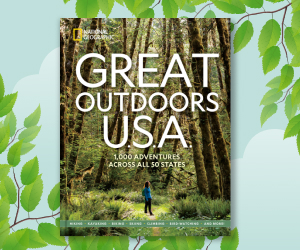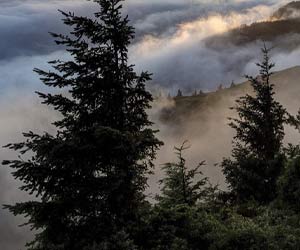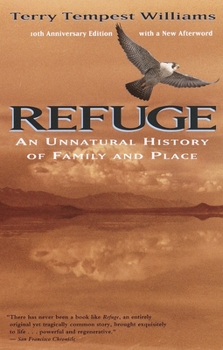Refuge: An Unnatural History of Family and Place
Select Format
Select Condition 
Book Overview
In the spring of 1983 Terry Tempest Williams learned that her mother was dying of cancer. That same season, The Great Salt Lake began to rise to record heights, threatening the Bear River Migratory Bird Refuge and the herons, owls, and snowy egrets that Williams, a poet and naturalist, had come to gauge her life by. One event was nature at its most random, the other a by-product of rogue technology- Terry's mother, and Terry herself, had been exposed to the fallout of atomic bomb tests in the 1950s. As it interweaves these narratives of dying and accommodation, Refuge transforms tragedy into a document of renewal and spiritual grace, resulting in a work that has become a classic.
Format:Paperback
Language:English
ISBN:0679740244
ISBN13:9780679740247
Release Date:September 1992
Publisher:Vintage
Length:352 Pages
Weight:0.62 lbs.
Dimensions:0.9" x 5.2" x 7.9"
Customer Reviews
5 ratings
Makes you cry. Powerful and moving!
Published by Thriftbooks.com User , 19 years ago
This book is so powerful and so moving, it brought me to tears in more than one place. This is an amazing story of place, family, love, and the desert. Last winter I had to read one of Williams' books for a course and have become addicted to her writings. Williams is a Mormon naturalist who pushes the boundaries of both, and her unique insights bring a freshness to both faith and preservation. I have tracked down and read all of her books that are currently in print, and this is the most powerful of them. Terry states in another book, "The great silences of the desert are not void of sound, but void of distractions." This book is about the silences and the distractions of death, the death of her mother and of the bird refuge that she loved and that was her solace. The chapter headings are unique, written as a journal, but not by date but by lake height. As the Great Salt Lake rose to record heights in the mid-1980's, Terry's mother was dying of cancer, and the Salt Lake's rising was flooding the Bear River Migratory Bird refuge. The refuge was sacred to Terry as a place she and her grandmother would visit together, and as a place to get alone outside of the city to reflect, meditate and believe. Terry begins the prologue with "Everything about the Great Salt Lake is exaggerated - the heart, the cold, the salt, and the brine. It is a landscape so surreal one can never know what it is for certain. ... Most of the women in my family are dead. Cancer. At thirty-four, I became the matriarch of my family." pg.3. This book chronicles one woman's love of the desert, of the bird refuge and of her family. It tells the story of cancer clusters in the desert where the US Government tested thousands of nuclear devices from the 1940's to the 60's. Journey with one woman, through disease, death, destruction and the desert; journey with her both through the physical landscape and the internal one, to a new place- a place of determination and desire to make change and to grow from all she has been through. Terry states in the epilogue, "I belong to a clan of One-Breasted Women. My mother, my grandmothers, and six aunts have all had mastectomies. Seven are dead. The two who survive have just completed rounds of chemotherapy and radiation." pg. 281. This is a story of a strong woman who shares her pain, and her strength, to help us all see what could be possible with the triumph of the human spirit.
A Natural History
Published by Thriftbooks.com User , 22 years ago
This is a unique book worth owning, reading, and pondering more than once. I am very grateful to Terry Williams for having had the courage to write it and have it published. I have had it added to our patient library.As a medical and radiation oncologist with nearly a quarter century of experience, as a man whose parents died of unusual malignancies, and as the parent of a child with cancer, grief is a part of the experience of life with which I am well acquainted. This book is probably the most honest and eloquent expression of grief and the struggle of an extraordinarily sensitive woman with spirituality and loss as I have ever read. It is not without its faults, but even these are very revealing about the way human beings deal with a world in which change and loss are inevitable.Faults? There are only two that come to mind. One is the title. There is nothing in this book that is unnatural in any way. Loss and sorrow are as natural as any other human experience. The second is the trap so many of us fall into of searching for cause and effect, a way to assuage grief by assigning blame that becomes evident in the final chapter. However, Mrs. Williams can be forgiven for that. She has left us with an insightful and lyrical account of her mother's illness and the comfort the beauty of the natural world brought to a daughter left alone. This is one woman with a sensitive and honest heart who is not afraid to let the rest of us look inside. There is much to be learned from what Mrs. Williams has written and Refuge is highly recommended.By the way, Terry, one of your mother's doctors, Gary Johnson, delivered my son who was fortunate enough to survive his own battle with cancer 18 years later. It was a pleasure to see his name mentioned. Gary was one man for whom I had a lot of respect when I was a senior medical student at the University of Utah in 1977. Thanks very much for writing this book. You have my apology on the part of my profession for the stupidly insensitive way your mom was treated on certain occasions. And you have my gratitude and respect as well. I wish I had known you and your family when I was growing up in SLC.MS
Brave and Poetic
Published by Thriftbooks.com User , 23 years ago
From the refuge of pain and loss in her Great Salt Lake desert world, Terry Tempest Williams weaves a beautiful and lyrical journal from the intricate fabric of landscape. A landscape that is both ravished by natural and perhaps man made destruction. The history of this land is the history of Williams' family and she serves the reader well as journalist, historian and naturalist.In the spring of 1983 a significant rise in the Great Salt Lake began to flood her beloved Bear River Migratory Bird Refuge and at the same time cancer cells began to flood her mother's body. As owls, avocets and egrets struggle to survive the rising waters, Williams' mother struggles to find peace and comfort in dying. Where mother nature is damaged, mother Tempest is too.Williams has a truly poetic ability to tie the spirit of land and of family into one beautiful image. "I am reminded that what I adore, admire and draw from Mother is inherent in the Earth. My mother's spirit can be recalled simply by placing my hands on the black humus of mountains or the lean sands of desert. Her love, warmth, and her breath, even her arms around me-are the waves, the wind, sunlight, and water.", she writes.In the process of dealing with so much pain and loss Williams shifts from a casual observer of life's folly to passionate activist. Ultimately she puts the pieces of puzzle together to see a picture of generations of cancer certainly tied to exposure to the on-going nuclear testing by the American government in the Utah desert. William's chilling awakening to the manipulation of the environment by man in the name of progress should serve as our own wake-up call to the capacity of destruction that we have tolerated.Landscape becomes refuge and offers hope of healing. Williams writes, "It's strange how deserts turn us into believers. I believe in walking in a landscape of mirages, because you learn humility. I believe in living in a land of little water because life is drawn together. And I believe in the gathering of bones as a testament to spirits that have moved on. If the desert is holy, it is because it is a forgotten place that allows us to remember the sacred. Perhaps that is why every pilgrimage to the desert is a pilgrimage to the self. "This book is a wonderful testament to life and to the power and capacity for regeneration and healing. The book also provides very poignant and heartfelt lessons on embracing our dying and our loss and celebrating life in every moment.
Powerful, intimate, important storytelling
Published by Thriftbooks.com User , 24 years ago
An intimate telling of family and loss, courage and humor, honest confrontations with mortality, a deeply spiritual tone, and chapter titles introducing us to over thirty different birds, this beautifully descriptive and authentic tale leaves us with tears and a search for binoculars and a bird guidebook. Terry Tempest Williams weaves with great detail the heart breaking and life affirming events of the simultaneous devastation of her mother's body and the migratory bird sanctuary that has been her refuge. She skillfully keeps from dramatizing this innately powerful story. Williams had me deeply attached to pages I knew would be increasingly painful to read. Yet, as it became more painful, I would never describe it as depressing. I am struck by the powerful way she honors her mother, their family's reverent yet human journey through a particularly virulent cancer, and the ultimate power of nature, and equally important, humanity's thoughtless interference with nature, to turn one's life into a personal desert that used to be called home. She is a master storyteller and a poweful activist. This must read challenges the reader to enter a world where solutions are not simple, and life is exposed at its most vulnerable while courage and passion abound.
Stark, wrenching, uplifting...
Published by Thriftbooks.com User , 24 years ago
I had the excellent fortune to be 'required' to buy and read this book for a university literature course nearly a year ago. Williams' simple, elegant prose gripped me fully for more than 80% of the book -- providing me with two sleepless nights during which I could not find it within my will power to leave the book until the next day. The intensity of several scenes were so formidable as to leave me, literally, trembling with emotion. The book provoked feelings which remain close to my heart still.Every student in my class of 30 felt unanimous in their high praise and, after a week's discussion, we were rather disappointed at the necessity of moving on to the next topic. It is one of those precious finds that would require a good deal of time to fully probe and reflect upon on the depth of its heart-felt narrative. Its symbolism, levels of meaning and complexity are well laid in a simple prose that is easily accessible.As for myself, I immediately sent a copy to my mother for Mother's Day, after which she related the same powerful feelings about the story and determined to send a copy to her own mother. Please, take the time to experience this book -- you will not regret the time well spent.
Refuge: An Unnatural History of Family and Place Mentions in Our Blog

Earth Love for Earth Month
Published by Ashly Moore Sheldon • April 21, 2024
Spring has sprung here in the Pacific Northwest and we are living for it! From the tulips nodding in our gardens to the swirling confetti of cherry blossoms to the brilliant rainbows following sporadic spring rainbursts, it's an intoxicating time. In celebration of Earth Day, here are fifteen books to help you connect with nature.

Celebrating Edward Abbey
Published by Ashly Moore Sheldon • January 31, 2020
In celebration of Edward Abbey's birthday earlier this week, we are featuring a reading list of similar authors who came before and after him. More than just environmentalists, these activists raised clarion calls in defense of nature.






